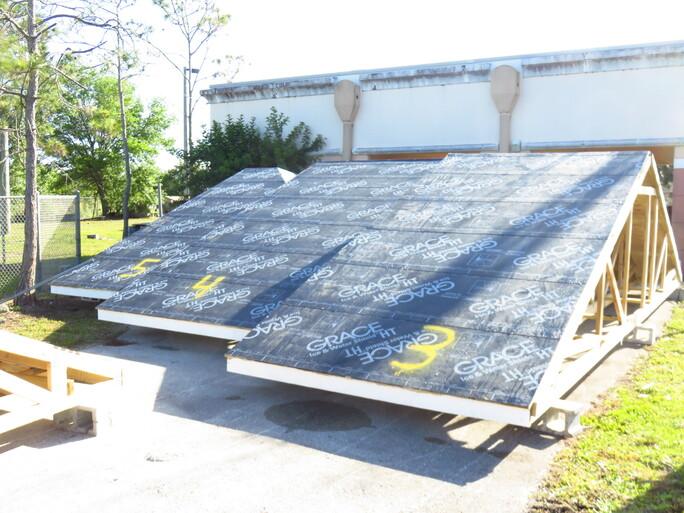Building Smarter and Safer Homes for Habitat for Humanity

By GCP Applied Technologies.
See how students and educators came together to use modular construction and self-adhered weather barriers to solve interesting challenges.
The Weitz Construction Academy at Seminole Ridge High School in Loxahatchee, Florida has partnered with GCP Applied Technologies for over five years, providing educational opportunities for students and needed homes for hardworking families in Palm Beach County.
Houses built by Weitz Construction Academy students are weather protected and in exchange for their efforts, the students learn important career skills and training to become the next generation of construction professionals.
In 2019 and early 2020, GCP once again donated their premium residential products – self-adhered roofing underlayment and weather barriers - to the Weitz Construction Academy for their students to build two new houses for Habitat for Humanity of Palm Beach County. The Habitat houses are 1,206 square feet with three bedrooms and two baths.
The challenges
The two houses needed to be completed in one semester, which meant that the construction schedule had to be extremely efficient to meet the aggressive timeline.
Coordinating education at an open build site and making sure all students were safe were critical factors for the success of the project. From transportation of the students and tools to the job sites, to coordinating schedules and bringing a classroom environment to a jobsite, the expenses and time involved add up.
Finishing elements of the construction had to be performed at each job site, leaving critical sections (such as roofs and walls) exposed to the elements during transportation.
Adding to the challenge is that the weather in Florida isn't what it used to be. Tropical storms and hurricane seasons have intensified in recent years. The uncertainty of Mother Nature often causes construction weather delays, and most importantly - completed houses need to withstand the worst weather, no matter their size.
The solution
To overcome these challenges, the Weitz Construction Academy chose the modular construction process for the Habitat Humanity project. The two houses were built in modular sections by the students in the school’s workshop and then transported via truck to the Habitat jobsites to be completed for their homeowners.
While the modular construction process provided a solution to the aggressive timeline and kept the educational environment organized and safe, the Academy wanted to ensure that their work in the workshop was not undone while transporting the modular houses. That’s why they looked to GCP Applied Technologies' portfolio of self-adhered weather barrier products.
GCP’s VYCOR® enV-S™, a fully adhered weather barrier that seals to the substrate, solved the transportation challenge in the modular process. The siding on the two modular homes had to be installed at the jobsite. This step meant that the homes needed to be transported from the school’s workshop to the Habitat job sites without the protection of siding, exposing the house to highway speed winds.
As VYCOR® enV-S™ weather barrier securely adheres to the substrate without mechanical fasteners, it can also resist damage due to jobsite conditions and wind.
“GCP’s VYCOR® enV-S™ weather resistive barrier is a stand out product, even passed our highway wind test each time,” said David Porter, Weitz Construction Academy volunteer architect and project manager. “Before installing siding on the modular house, we transport the house from the school workshop to the Habitat jobsite. The truck drivers put VYCOR® enV-S™ weather barrier to the test by hitting the highway at 70mph during the trip. We call it our ‘category 1 hurricane test’ and the weather barrier survived nicely, without a hint of peeling away. Prior to discovering VYCOR® enV-S™ weather barrier our use of standard building wraps ended up with most of it pulling away from the sheathing, like sails in the wind, and ended up on the roadway!”
The donation of GCP’s GRACE ICE & WATER SHIELD® self-adhered roofing underlayment also played a critical role in the modular construction process. Easily applied in the workshop, the roofing underlayment served as a temporary roof covering and provided premium weather barrier protection for the modular houses’ roofing systems, as it seals to itself at overlaps, seals to the roof deck, and seals around the fasteners used to attach the shingles. All these features help prevent water from leaking into a home, even in Florida’s rainy and windy climate.
Once the two houses were delivered to the Habitat job sites, shingles and other finishing touches were installed. The Academy’s modular construction strategy provided multiple benefits:
Reduced construction schedule: The students were able to construct the two Habitat homes simultaneously in the workshop. As a result, the project was completed in half the time when compared to traditional construction.
The elimination of weather delays: By conducting the majority of the home construction inside the school’s workshop, they did not have to work around Mother Nature’s schedule.
Safer construction: The indoor construction environment reduced the risks of accidents and related liabilities for the students.
Protection: The selection of premium self-adhered products fit into the modular process perfectly, protecting the houses from the transportation of the unfinished houses, as well as long term, protecting the houses from Mother Nature.
“Due to the students outstanding work with the modular process and GCP’s overwhelming generosity, Habitat for Humanity has been able to build new beginnings for families in need of homes that they can count on,” said Robert Flood, Habitat for Humanity of Palm Beach County Quality Control Representative.
According to the Modular Home Builders Association, modular houses have proven to be more resilient than on-site built construction. The reason for their strength is each module is engineered to independently withstand the stresses of transportation and the module-to-module combination of the units provides a rigid system. Building offsite also provides improved quality management. As a result, the use of the modular construction process and premium building products have provided a safe and stable place for these new homeowners.
Learn more about GCP Applied Technologies in their RoofersCoffeeShop® Directory.
Original article source: GCP Applied Technologies
























Comments
Leave a Reply
Have an account? Login to leave a comment!
Sign In